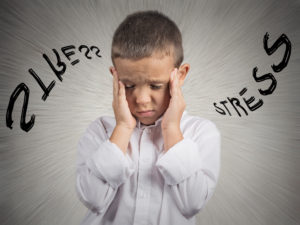
A recent article in the New York Times, Is the Drive for Success Making Our Children Sick? reports a nation-wide epidemic of school-related stress.
Expectations surrounding education have spun out of control. On top of a seven-hour school day, our kids march through hours of nightly homework, daily sports practices and band rehearsals, and weekend-consuming assignments and tournaments. Each activity is seen as a step on the ladder to a top college, an enviable job and a successful life. ~ Vicki Abeles, New York Times, January, 2016
What Are the Effects of Over-Scheduled Kids?
Vicki Abeles reports that modern education is making our children sick – mentally and physically.
The article summarizes the work of Dr. Slavin who conducted an anonymous survey of two thirds of Irvington High School in California – increasingly in Silicon Valley’s orbit. He was shocked by the results: 54 percent of students showed moderate to severe symptoms of depression. Even more alarming… 80 percent suffered moderate to severe symptoms of anxiety. This survey didn’t even include all the Advanced Placement students as they were writing AP exams that day! Imagine their stress levels?
What Do We Need to Watch Out for?
Anxiety is often misunderstood and is often invisible to observers on the outside. However, to the person experiencing anxiety it is very, very real. When gripped by anxiety, one truly believes “I can’t do……” whatever the task might be. The person’s thoughts are all fearful and the only solution seems to be to AVOID – the exact fuel that drives anxiety. Anxiety and depression can become intertwined. If an anxious person continues to feel helpless and continues to avoid, this can lead to feelings of hopelessness and further WITHDRAWAL – one of the most common signs of depression.
This is why early detection is important. I feel very encouraged that so many schools are doing their part in creating more awareness about anxiety, stress and the proactive strategies to help reduce anxiety. This week I had the pleasure of presenting to the staff of the Collingwood Junior School on Understanding Anxiety in Students and Proactive Strategies for Supporting Them. I always feel very encouraged when I present to groups such as this and can feel their passion to support students’ mental health.
Living in a high-achieving community, I believe it’s important to take heed of Irvington High School’s experience. They are extremely concerned and they’ve made changes which are already showing positive results.
- Teachers are re-examining their homework demands, in some cases reviving the school district’s forgotten homework guideline — no more than 20 minutes per class per night, and none on weekends.
- Students have started a task force to promote healthy habits and balanced schedules.
- For the past two years, school counselors have met one on one with every student at registration time to guide them toward a manageable course load (Source: Is the Drive for Success Making Our Children Sick? Jan. 2016)
How Much “Down-Time” Does Your Child Have?
- Is your child getting enough sleep? (According to WebMD: Ages 3-6 years need 10-12 hrs. Ages 7-12 yrs. need 10-11 hrs. Ages 12-18yrs. 8-9 hrs.) We all need enough sleep for our bodies to repair and rebuild from the stress of the day, ready for the next day. However, research shows that many North American teens are missing two hours/night of needed sleep-time. The more homework they do, the less sleep they get.
- Does your child know how to spend time by him/herself? This is an important skill. Many people are so busy that they don’t know how to experience solitude. Read my article on Technology and the Impact on Creativity and Sherry Turkle’s work from Alone Together, for more on this topic.
- How many family meals do you have during the week, where you all sit down together? Researchers at Cornell University performed rigorous research that explored the effects of family meals and found that youth who engage in more frequent family meals tend to have lower depressive symptoms
- Is your child overly peer-attached? Research in the journal Paediatrics & Child Health, (Moretti & Peled), found that
“Adolescent-parent attachment has profound effects on cognitive, social and emotional functioning. Secure attachment is associated with less engagement in high risk behaviours, fewer mental health problems, and enhanced social skills and coping strategies.”
- Is there pressure on your child to compete? Is this what your child wants? If your child is internally motivated to reach the provincials, nationals and beyond, then it is his/her choice. If a child is doing it to please his/her parents, this is external motivation and a lot of pressure which can result in mental health complications.
As always, it seems that “balance”, “moderation” and staying connected to our kids, are the key factors. However, with the rapidly increasing rates of anxiety and depression, we need to watch out that aiming for SUCCESS doesn’t become a new disorder: SUCSTRESS.
Warmly,

Want to Connect?
Subscribe now to receive free weekly parenting tips and inspiration.






